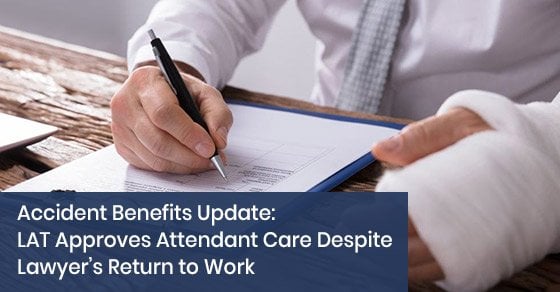
On March 20, 2020, the Licence Appeal Tribunal (LAT) released its decision in J.W. v. Security National Insurance Company (2020 CanLII 30385). The central question in this decision concerned a catastrophically injured (catastrophic) applicant’s entitlement to Attendant Care (AC) benefits, and the quantum of those benefits if found reasonable and necessary. The applicant, J.W. had been seriously injured in a motor vehicle accident on October 20, 2014 while riding a motorized scooter. He sustained a traumatic brain injury (TBI) and multiple orthopedic and other injuries. Security National, his accident benefits insurer, accepted that he was catastrophic.
In May 2016, the applicant submitted a new Assessment of Attendant Care Needs (Form 1) that concluded he required AC in the amount of $803.99 as a result of ongoing physical, emotional, psychological and cognitive impairments caused by the accident. The primary needs identified in the Form 1 included evening meal preparation due to fatigue, and emotional support, cues and reminders due to forgetfulness and irritability, all stemming from the TBI.
Security National denied the AC and scheduled an In-Home assessment which found that no further attendant care was required. Its position was supported by the applicant’s return to full-time employment as a litigation lawyer.
Adjudicator Norris acknowledged at the outset that the, "optics of this matter may seem unusual; here, the applicant experienced catastrophic cognitive injuries and claims entitlement to ACBs, but has since returned to and intellectually challenging vocation which requires long work days." After performing a thorough analysis of the conflicting evidence, however, he held that the applicant was entitled to continuing AC.
The applicant submitted reports from his occupational therapists, social worker, physiatrist, psychologist, neurologist and orthopedic surgeon. These reports consistently documented his ongoing struggles with debilitating physical and cognitive fatigue, leading to impaired memory and concentration, irritability and decreased physical tolerances.
In response, Security National provided reports (the responding In-Home assessment, two OT reports and a cognitive screening assessment) which, it claimed, demonstrated that the applicant was able to care for himself. The insurer’s submissions focused solely on the applicant’s physical capacity to perform his activities of daily living.
Adjudicator Norris rejected these submissions. He observed that Security National’s In-Home assessor did not include any testing of forgetfulness, irritability or disorganization, and the remaining reports all identified significant cognitive impairment in the course of testing, which should have been factored into the AC decision. Based on these considerations, he found that the applicant was entitled to $803.99 per month in ongoing AC for tasks including evening meal preparation, emotional support, cues, and reminders due to fatigue, forgetfulness and irritability. There was no evidence establishing that the applicant had incurred AC expenses related to these tasks. Finally, the Adjudicator held that there was no reason to provide a special award against Security National for unreasonably withholding or delaying payment. While insufficient attention was paid to the applicant’s cognitive complaints in the insurer’s In-Home assessment, the dispute arose over conflicting professional opinions, not an arbitrary or unjustified decision by Security National.
IMPACT: This decision highlights the need to advocate on behalf of accident victims, even when the "optics" are unusual. Security National’s scepticism was understandable on these facts, and without strong legal representation, J.W.’s family would have been required to bear the additional stress and labour needed to keep him employed.
If you have been seriously injured in a car accident and have questions about your entitlement to benefits or your claim generally, we are pleased to offer a free consultation. Put Campisi LLP to work for you - Clients First, Excellence Always!
Subscribe to our newsletter
Get free insights delivered right to your inbox
Give us your email address and we’ll send you the latest information on updates to the legal and insurance system and learn how you can make the best recovery possible.
.jpg?width=726&height=440&name=image%2013%20(1).jpg)
Recent Posts
Put our expertise to work for you.
If you or a loved one has been seriously injured, you need a personal injury lawyer who puts client care first and who also knows how to navigate the complex legal system.
Contact Us Now